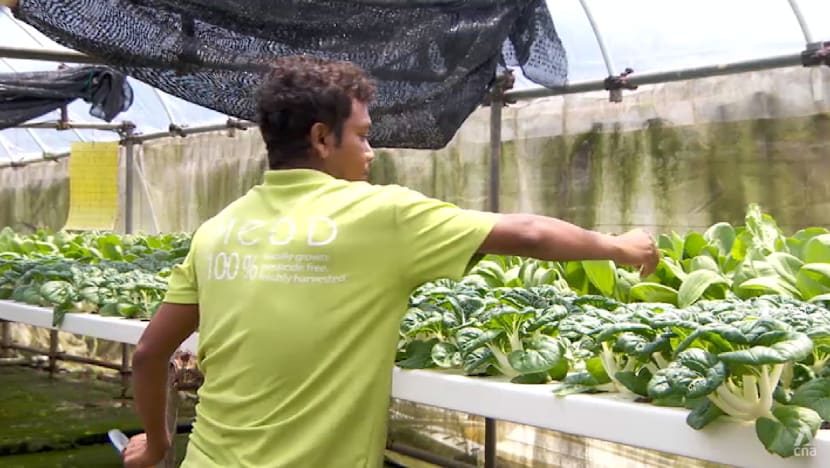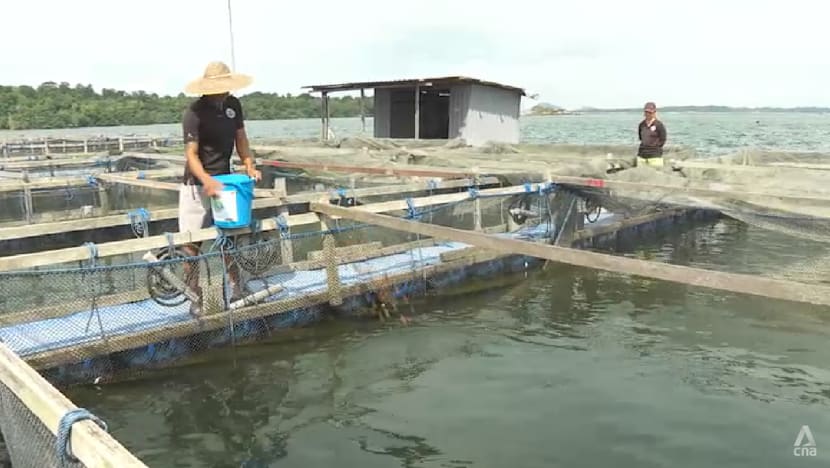Singapore invests S$40.5m in agri-food innovation to boost food security and sustainability
The country imports more than 90 per cent of its food needs, leaving it vulnerable to external shocks and supply disruptions.

Singapore imports more than 90 per cent of its food needs, leaving it vulnerable to external shocks and supply disruptions.

This audio is generated by an AI tool.
SINGAPORE: Singapore is investing S$40.5 million (US$31 million) into research and innovation programmes to strengthen the nation’s food security and raise the quality of locally produced food.
Senior Minister of State for Sustainability and the Environment Zaqy Mohamad said on Wednesday (Nov 5) that these efforts aim to help Singapore produce more with fewer resources.
“As a small country with limited space and resources, the challenge for local food production is in the productivity and costs,” he added.
“Hence, to enable the industry to be more productive and market competitive, Singapore needs to harness science and technology to develop cutting-edge solutions.”
He was speaking at the Global Agri-Food Scientific Symposium, held as part of the Singapore International Agri-Food Week.
Singapore imports more than 90 per cent of its food needs, leaving it vulnerable to external shocks and supply disruptions.
Factors such as climate change and disease outbreaks are reshaping global food production and straining systems that have long underpinned food security, said Mr Zaqy.
“Given this reality, we must ensure a reliable supply of safe food for Singapore.”

CLIMATE-RESILIENT CROPS, DISEASE-RESISTANT SEABASS
Under the Seed Innovation Hub programme, farmers will be supported in growing higher-value crops with broader appeal and commercial viability.
The programme received a S$22 million boost from the authorities to develop superior seeds suited for tropical climates and controlled-environment agriculture, with traits such as faster growth and higher nutritional value.
Professor Chew Fook Tim from the National University of Singapore’s biological sciences department, who is leading the project, said running an indoor farm is costly, and sustainability depends on improving yields and crop value.
This involves developing plants with desirable traits such as better taste and added health benefits that make them more attractive to consumers, he added.
This could “create new markets for our farmers to play with”, so that they can compete differently from others, he said.
“We have to create something new that will be special for Singapore.”
Another S$18.5 million will go to the AquaPolis aquaculture programme to reduce production costs and improve the quality of locally farmed Asian seabass.
This includes breeding parasite-resistant juvenile seabass through selective breeding techniques.
Dr Richard Le Boucher, partnership director at AquaPolis, said local fish farmers face challenges such as securing affordable, high-quality feed and dealing with pathogen-related issues.
He added that ongoing research aims to improve fish survival rates and enhance quality.
“They also face competition against other farms or other countries,” said Dr Le Boucher, who is also a research director at non-profit research organisation Temasek Life Sciences Laboratory.
“So we try to improve the quality, for example the Omega-3 content of the fillet, by choosing good feed and improving the fish.”
MORE SUPPORT NEEDED
While initiatives to reduce production costs are underway, farmers say more immediate support is still needed.
Singapore will drop its “30 by 30” food sustainability goal launched six years ago, with new targets amid a move to refresh the country's food resilience strategy.
Minister for Sustainability and the Environment Grace Fu on Tuesday said these targets will be for specific food categories that take into account the strengths of the local farming ecosystem and potential for supply growth.
The new goals are for local farms to supply 20 per cent of the local consumption of fibre and 30 per cent of the local consumption of protein by 2035.
One of the strategies that authorities are exploring is the feasibility of a pilot multi-tenanted facility for agri-food production.
The results of the study are expected to be released within the next one-and-a-half to two years.
Kranji Countryside Association president Malcolm Ong welcomed the idea, saying shared infrastructure and costs could ease farmers’ financial pressures.
The founder of aquaculture company The Fish Farmer added that firm contracts would give farmers greater certainty by ensuring their produce has committed buyers.
“There are many countries where they have contract farming (practices), where they contract the farmers to produce so much for them,” he added. “With this, then it takes away some uncertainty from the farmer.”
Several farmers told CNA that the new targets are achievable.
Mr Nelson Tan, CEO and founder of circular agriculture solutions provider V-Plus Agritech, believes Singapore’s climate and infrastructure offer the potential for expanding local food production, noting that there is a need for "the right incentives in place for us to reach these targets".
“Let's say prisons, Singapore Armed Forces (SAF) or hospitals can buy 30 per cent of the produce, that’s actually (of) great help," he added.
“Our industry is very young. We still need a lot of time and nurturing to make it more mature.”




















